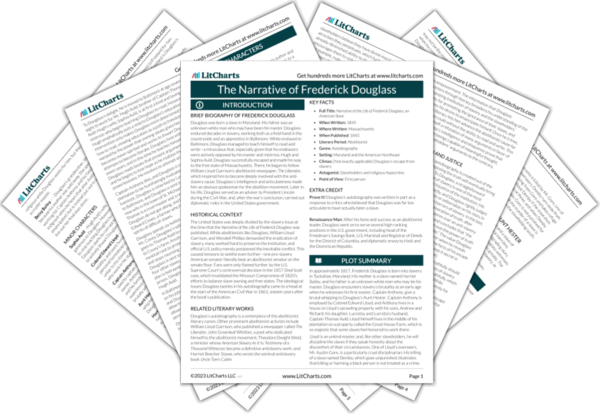In approximately 1817, Frederick Douglass is born into slavery in Tuckahoe, Maryland. His mother is a slave named Harriet Bailey, and his father is an unknown white man who may be his master. Douglass encounters slavery’s brutality at an early age when he witnesses his first master, Captain Anthony, give a brutal whipping to Douglass’s Aunt Hester. Captain Anthony is employed by Colonel Edward Lloyd, and Anthony lives in a house on Lloyd’s sprawling property with his sons, Andrew and Richard; his daughter, Lucretia; and Lucretia’s husband, Captain Thomas Auld. Lloyd himself lives in the middle of his plantation on a property called the Great House Farm, which is so majestic that some slaves feel honored to work there.
Lloyd is an unkind master, and, like other slaveholders, he will discipline the slaves if they speak honestly about the discomfort of their circumstances. One of Lloyd’s overseers, Mr. Austin Gore, is a particularly cruel disciplinarian. His killing of a slave named Demby, which goes unpunished, illustrates that killing or harming a black person is not treated as a crime.

To Douglass’s delight, he is moved to Baltimore at age seven or eight to work for Mr. Hugh Auld, brother of Captain Thomas Auld. Hugh’s wife, Sophia Auld, is at first a kind and loving mistress who begins teaching Douglass to read. However, Hugh emphatically puts a stop to Douglass’s education. Hugh’s intervention only makes Douglass more determined to learn how to read, viewing education as a path to freedom. Sophia is warped by the power that owning slaves gives her. She becomes mean-spirited and works to thwart Douglass’s attempts to become literate. Douglass lives with the Aulds for seven years, and in this time he teaches himself to read. Douglass reads books that present arguments against slavery, and he begins to lose hope as he realizes the extent of his powerlessness. He resolves to attempt an escape.
Captain Anthony dies, and Douglass is sent back to Lloyd’s plantation to be humiliatingly evaluated alongside Anthony’s livestock. Douglass is inherited by Lucretia Auld and sent back to Baltimore, and Douglass is sent to live with Thomas and his new wife in the town of St. Michael’s, Maryland in 1832. Thomas is a cruel master and a religious hypocrite. He and Douglass do not get along, and Douglass is sent to work for Edward Covey, a farmer who has a reputation for breaking the spirits of difficult slaves.
Douglass spends six hellish months working for the malevolent Mr. Covey. Douglass’s spirits are broken by the work, and he goes to Thomas Auld to protest his treatment, but is sent back to Covey’s farm. Another slave, Sandy Jenkins, gives Douglass a mystical root to protect himself. Douglass stands up to Covey and stops receiving whippings. After a year with Covey, Douglass is sent to live with William Freeland. Douglass and four other slaves attempt to escape from Freeland’s, but their plan is betrayed and Douglass ends up in jail. After some time in prison, Douglass is sent back to Baltimore to work again for Hugh Auld.
In Baltimore, Douglass works for a shipbuilder, and is assaulted on his jobsite. Hugh apprentices him to another shipbuilder, and Douglass learns how to caulk. Douglass’s caulking skills allow him to earn good money for Hugh. Hugh temporarily allows Douglass to work for his own pay, but later revokes this permission. Douglass then decides to plan an escape.
Douglass escapes successfully. To protect those who helped him and enable future slaves’ escapes from slavery, Douglass does not describe his escape in detail. Once free, Douglass ends up in New York, and is helped by Mr. David Ruggles. In New York, Douglass weds a free woman named Anna. The newlyweds then make their way to New Bedford, where Douglass is aided by a man named Nathan Johnson. Douglass is amazed by the prosperity the north has achieved without slaves. After some time in New Bedford, Douglass begins reading The Liberator, an abolitionist newspaper. This inspires Douglass to speak at an anti-slavery convention in 1841, which launches his career as an anti-slavery advocate.







